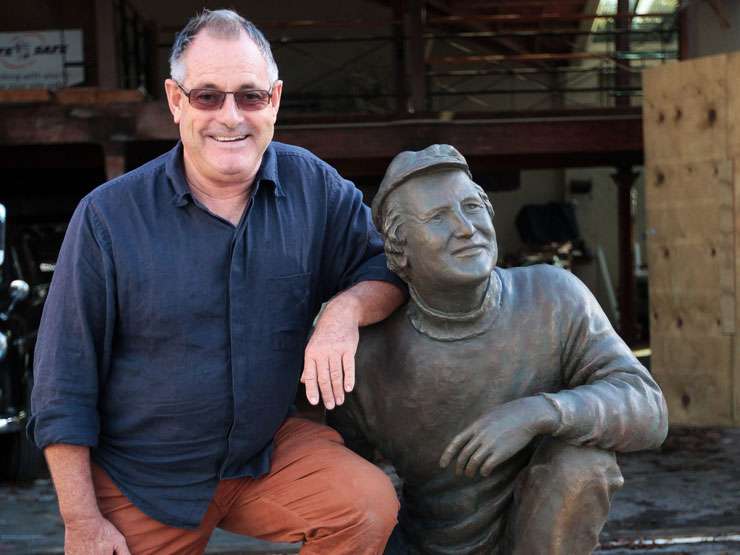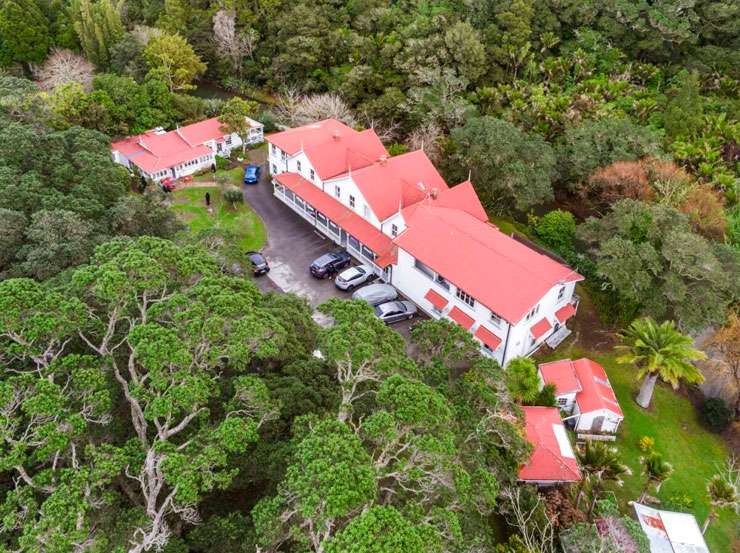A historic property from New Zealand’s early colonial days is on the market for the first time in a generation.
Ōrewa House is the oldest site of colonial settlement in Ōrewa, having been part of a landholding purchased by Governor William Hobson in 1841. It has changed hands rarely since.
The current owner, Kevin Harvey, says his father was instrumental in restoring the property from the brink of destruction. “The property was in such a bad state of disrepair that the fire brigade planned to burn it down as a training exercise,” he says.
“Dad put a stop to that by purchasing the property in 1977, and we’ve since brought it back to its former glory.”
Start your property search
Kevin’s father was Les Harvey, who is known in heritage circles for buying and restoring historic buildings in Auckland, and had fallen in love with Ōrewa House as a young boy.
“Dad and granddad used to stay there over the school holidays, back when it was a guesthouse. They’d go fishing in the stream and became fascinated with the stories about the property’s history,” Kevin says.
History in the making
The property was first developed by Major Isaac Rhodes Cooper, who arrived in Ōrewa in 1856. He bought 25ha of land and recruited 40 army volunteers to dig drains and build a cottage from wide, pit-sawn kauri planks.
Cooper became Ōrewa’s postmaster in 1857, running the post office from his cottage, and was twice elected to the Auckland Provincial Council. He later led the Whānganui militia but was dismissed in 1862 over his relationship with Rora Te Makohe, the daughter of the chief of Ngāti Tamakana.
Cooper married Rora in 1864 and the couple returned to Ōrewa House, where they had two children. A walnut tree, gifted to Rora Cooper by Governor George Grey, remains on the grounds to this day.

Kevin Harvey with a statue of his late father Les Harvey. Both men saved Ōrewa House from the brink of destruction. Photo / Supplied
The Coopers remained at Ōrewa House until 1868, when Major Cooper was appointed commander of the Thames militia. They sold up to a couple of aristocratic background – Major Collings Jersey de Grut and his wife Anne – who had earlier established an unsuccessful farm at Chelsea on Auckland’s North Shore.
The Gruts extended the cottage dramatically, transforming it into a 30-room mansion with a ballroom, billiard room and metre-deep cast iron bath, reputed to be the first of its kind imported to New Zealand.
Major Grut continued to run the post office and established a store, which accepted kauri gum as payment. He also set up a surf boat service to transfer goods and passengers ashore from the Auckland mail steamer, and cut a carriage track over the hill to Waiwera, which was later formalised as part of the road network. These developments – along with the Gruts’ renowned hospitality and the skill of their cook, Mrs Sykes – ensured Ōrewa House became a local centre of commerce and social life.
Guesthouse years
Major Grut died in 1888 and his two younger sons continued to run the business, which was registered as a guesthouse in 1906. The Gruts sold up in 1919 to Alice and Thomas Eaves, who set about extending the dining room and adding more bedrooms.
Alice Eaves was a passionate guesthouse host who arranged concerts and tea parties in the garden, punting on Nukumea Stream, gala balls, yachting regattas and trips to the Waiwera hot pools. She gifted to council the adjoining 16ha of coastal bush, which features stands of kauri and broadleaf forest, with an historic pa site nestled amongst the trees. The Alice Eaves Scenic Reserve remains a popular destination today.

The grounds of the property are extensive. The buildings are currently used by health and wellness operators. Photo / Supplied
The Eaves sold the property in 1957 to a group of Theosophists, who continued to lease it as a guesthouse, but later let it fall into disrepair. Les Harvey purchased the property two decades later.
“Dad admitted he was mad to buy it, but he was never motivated by profit,” says Kevin. “He wanted to preserve the heritage and create something unique. And he absolutely loved being there – he described it as a magic place.”
Restoration work began with the former watch house, which was transformed into the Walnut Cottage Cafe.
Renovation work
Ōrewa House itself stood empty for a decade while Les and his wife, Zena, worked on their vision to transform it into an arts centre. Kevin was integral in leading the transformation.
After about $1,000,000 of renovation work, including new foundations, re-piling and the installation of matai floors, the Ōrewa House Gallery Centre for the Arts opened in 1991. Zena taught arts at the centre and lived in an apartment upstairs following her husband’s passing in 1994.
The Harvey family is now selling the land and buildings at Ōrewa House to realise the continued renewal of their assets in Parnell.
Colliers International is marketing the property for sale by auction on August 26, unless sold prior.
Tony Allsop, Director of Colliers’ Auckland Investment Sales team, says: “There’s simply nothing else like this available in Ōrewa, especially given the property’s rich background,” he says.
Shoneet Chand, Director of Colliers North Shore, says the current commercial tenants are part of the health sector and include an osteopath, massage therapist, chiropractor, beautician, maternity clinic and health centre.
“The Walnut Cottage Cafe operates from a standalone building and is a popular cafe offering all-day dining to Ōrewa locals and visitors. Its position, adjacent to the Nukumea Stream, capitalises on the sprawling grounds with a picturesque backdrop and plentiful carparking.”
The buildings have Category B heritage listings, while the underlying land is zoned Mixed Housing Urban.
“Ōrewa House represents a one-off opportunity to buy a unique piece of New Zealand’s history,” says Allsop.































